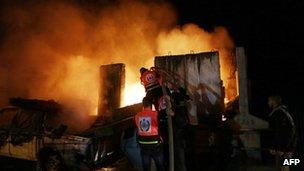Gaza crisis: Tel Aviv targeted by missiles
- Published

Palestinian militants have targeted Israel's commercial capital Tel Aviv with missiles fired from the Gaza Strip amid escalating violence in the region.
Residents took cover after air raid sirens alerted them to a missile threat for the first time there since 1991.
One missile landed in an uninhabited area while at least one more is thought to have landed in the sea off the city.
Meanwhile, Israel's defence minister has authorised the call-up of 30,000 reservists.
The BBC's Richard Galpin, in Jerusalem, says speculation is mounting that the Israeli army is preparing to launch a ground offensive into the Gaza Strip.
Eighteen Palestinians have been killed in Israeli operations against militants in Gaza since Wednesday afternoon, when an Israeli air strike killed the military leader of Hamas, the militant group that controls the territory, in his car in Gaza City.
Three Israelis have died during a barrage of hundreds of missiles fired from Gaza, mostly into southern Israel, some of which have been intercepted by Israel's Iron Dome missile defence system.
'Ferocious assault'
The rocket fired at Tel Aviv that came down on dry land hit a field in the suburb of Rishon Lezion, south of the city.
The armed wing of Islamic Jihad said it had fired an Iranian-built, Fajr-5 rocket at Tel Aviv.
"We have widened the range of the battle to reach Tel Aviv and what is coming will be greater," the group said in a statement.
This is the first time Tel Aviv has been threatened by missiles since the first Gulf War, when missiles fired by Saddam Hussein's Iraq landed in the city.
Israeli Defence Minister Ehud Barak said: "This escalation will exact a price that the other side will have to pay."
The Hamas Prime Minister in Gaza, Ismail Haniyeh, condemned what he called Israel's "ferocious assault" against the territory.
"We here in Gaza will remain steadfast and unshaken," he said in a televised statement. "We will fend off the aggression.
"We are all confident in our intrepid resistance fighters who are now deployed on the front."
Late on Thursday, BBC correspondents in Gaza reported several massive explosions and missile fire in and around Gaza City as Israeli strikes continued.
Many of the Palestinians killed in Gaza during the last two days by the Israeli aerial and naval bombardment were members of militant groups, but civilians - including at least four children - were also among the dead. They included 11-month-old Omar, the son of Jihad Misharawi, a BBC Arabic picture editor.
The three Israeli civilians who died - two women and a man - were killed on the top floor of a block of flats in the southern town of Kiryat Malachi that suffered a direct hit by a rocket.
'No justification'
Israeli PM Benjamin Netanyahu has said Israel will do "everything in its power" to avoid civilian casualties in the conflict with Hamas.
But he said Hamas was deliberately placing its rockets and missiles in civilian areas prior to launching them at Israel.
"There is no moral symmetry between Israel and the terrorists in Gaza," he said during a televised news conference in Tel Aviv.
"Hamas deliberately targets our children and they deliberately place their rockets next to their children. Now despite this reality - and it's a difficult reality - Israel will continue to do everything in its power to avoid civilian casualties."
Egypt's new Islamist President Mohammed Mursi called the Israeli bombardment "unacceptable aggression".
Egyptian Prime Minister Hisham Qandil is to travel to Gaza on Friday in a show of support for the people of the territory.
The United States, Israel's key ally, has called on countries that have contact with Hamas to urge it to stop rocket attacks from Gaza.
"We've... urged those that have a degree of influence with Hamas such as Turkey, and Egypt and some of our European partners to use that influence to urge Hamas to de-escalate," said Ben Rhodes, deputy national security adviser, in a conference call with reporters.
Asked if the US was concerned that Israeli ground forces would enter Gaza, Mr Rhodes said: "Ultimately it's up to the Israeli government to make determinations about how they're going to carry out their military objectives."
Arab League foreign ministers plan to meet in emergency session on Friday to discuss the escalating violence.
Israel's aerial and naval bombardment of the Gaza Strip, which began after a recent wave of rocket attacks from there, is its most intense assault on the Palestinian territory since it launched a full-scale invasion four years ago, also in response to rocket fire.